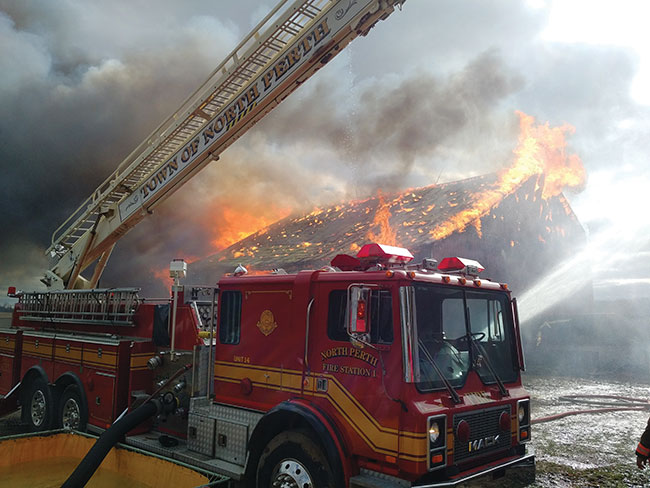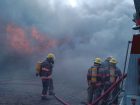
Features
Common sense in the fire service
Common sense in the fire industry. It’s something that…
July 15, 2019
By Kevin Scholl
 Incident commanders don’t really know what they’re getting into until they arrive at the fire scene.
Incident commanders don’t really know what they’re getting into until they arrive at the fire scene. Common sense in the fire industry. It’s something that seems to fade at any type of emergency call, be it a fire, motor vehicle collision, or medical, etc.
In the fire service, we see so many different types of situations and scenarios on our call-outs.
I’m not trying to condemn anyone in this article, but would simply like to express what I have noticed in my 43 years in the fire service.
There are numerous studies being completed on topics ranging from fire behaviour to building construction, and extrication to search and rescue.
These studies all have an impact on the way that we operate and the way that we train.
The training that we go through now is better than it has ever been before.
With that being said, I feel there is still not enough being done to promote the importance of exercising common sense at a fire scene.
Due to the sheer number and variety of different types of incidents and fires that we are called to, it is difficult to know exactly what you’re getting into until you actually arrive on-scene.
Upon arrival, there are numerous decisions that need to be made in a very short amount of time that are all dependant on that specific situation.
For example, if there is a three-vehicle collision on a main highway, the first truck on the scene will have an officer who will become the incident commander (IC).
That officer will control the scene and make decisions on what to do and how resources should be deployed.
The IC will do a 360, check the situation and relay to the incoming crews what to do. He or she will also indicate where the most serious injuries are and how many patients have been involved.
The IC will also advise the incoming crews of any fluid leaks, overhead hydro lines, etc.
In these situations, the worst mistake the officer can make is getting tunnel vision. This is the point when common sense needs to kick in.
We have all likely made this mistake at one point in our fire-service career, but we need to try to keep a clear mind and look at the whole picture.
The IC must take a deep breath and don’t let his or her mind play tricks.
If you’re the IC, it’s important that you try to make the right decisions based on your training and experience.
Converse with other officers on scene to make big decisions on how to best handle the situation.
If you are the IC, though, it is up to you to make the final decision, and hopefully, if you’re demonstrating common sense, it will be the right decision.
Attitude plays a big role in making sensible decisions.
For example, if the IC starts the scene off by yelling out orders at his or her firefighters and cursing and swearing, that individual is not making sensible decisions. An officer needs a calm and clear mind to be able to think.
The attitude of Incident Command reflects on the firefighters at task because they also need to work with a clear mind, no matter what the situation is.
I have seen this happen and the firefighters question any decisions by the IC after that.
In the fire service, we train as a team and need to work as a team with each response, and common sense plays a huge role in these circumstances.
When there is a multi-station response, (for example, if six other fire departments respond to a fire scene) this is where IC really has to have a clear mind, especially in the volunteer areas like we are in.
IC has so many decisions to make, such as:
- Making your plan
- Water shuttle
- Placing each station around the scene
- Fire attack, etc.
IC has to have a clear mind and rely on common sense and use his or her training to the best of his or her knowledge.
We have had a few of these calls and everything went well, but I have read and seen that other areas have had problems, which we all do.
Nobody is perfect.
I have seen where arrogance takes over common sense and these things should not be happening.
I realize departments have their boundaries, but if there is a house fire in a rural area, for example, water will likely be the biggest issue and there should be water tankers coming from all stations closest to the scene.
I realize that each department likes to use all of their resources first.
But if there is a tanker (or tankers) 15 kilometres from the scene and IC has tankers coming from 40 kilometres away, which is the common-sense thing to do?
This is not making the right decisions.
People’s lives could be at risk.
If your department choses to wait on tankers from a farther distance instead of using other tankers within the responding station’s area, that is being arrogant over using common sense.
To me this is wrong.
We are in the fire service, whether it is full-time or volunteer, to help people and let’s not forget about helping each other.
We could talk about different scenarios until we’re blue in the face.
But the main point that needs to be understood is that we need to see more common sense in the fire service.
It is not something that we can open to a specific chapter in a textbook and learn about.
It is something that needs to come from within every individual firefighter.
We can all help ourselves practise this skill by keeping a clear mind and making the right decision every time we are on route to a call.
Rely on your training, knowledge and experience to help you make sensible decisions.
Kevin Scholl is district chief of the Atwood Station for the North Perth Fire Department. He joined the department in 1976 and was a captain for approximately 25 years. He was appointed district chief in January 2013.
Print this page
